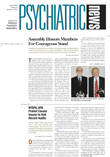Oxford Health Plans, a managed care company based in Connecticut, said last month it will stop auditing psychiatrists and mental health professionals for documentation of therapy sessions
(Psychiatric News, November 7; also see
page 3).
Oxford pledged to refund amounts paid by audited psychiatrists and mental health professionals to settle claims of alleged documentation errors and return copies of patient records, according to Oxford spokesperson Maria Gordon Shydlo.
Oxford’s chief medical officer, Alan Muney, M.D., said in a press release that the company realized that the variability in documentation of therapy sessions by clinicians was not due to fraud but inconsistent documentation guidelines.
APA and the New York State Psychiatric Association (NYSPA) said they were pleased with Oxford’s decision to terminate audits of psychiatrists and mental health professionals.
APA President Marcia Goin, M.D., told Psychiatric News, “Oxford will join with APA, NYSPA, and the New York State Society for Clinical Social Work to develop and adopt mutually acceptable standards for office medical record documentation.”
She continued, “This is a stunning example of what can be achieved through collaboration and informed aggressive efforts on behalf of our members and their patients.”
NYSPA Executive Director Seth Stein, J.D., who hammered out the deal with Oxford, told Psychiatric News, “This is a positive development by Oxford. I was particularly pleased that the company agreed to return copies of patient medical records obtained from audited psychotherapists. I insisted on this to avoid potential breaches of confidentiality that can occur when records are simply disposed of without adequate safeguards.”
Stein plans to meet again with Oxford representatives about the company’s use of the extrapolation method in audits and qualifications of peer reviewers. APA raised concerns about these issues in a November 7 letter to Oxford President and CEO Charles Berg.
The American Psychoanalytic Association and the American Psychological Association wrote Berg in October about similar concerns.
“We also want to ensure that if Oxford uses the documentation standards as a measure of compliance in future mental health care audits, [the company should] disclose the purpose and protocol for audits and any payment recovery plan to psychotherapists before they sign the contract,” said Stein.
APA’s November 7 letter to Oxford is posted on the APA Web site at www.psych.org/news_room/press_releases/CE_letter.cfm. ▪
